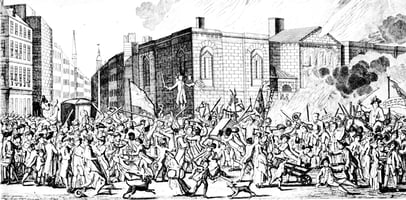We Come For Our Own And We Shall Have It
Smuggling In Poole And Dorset
Kevin Davis
arrrr! Everyone loves pirates, and rightly so. The social and cultural legacy of these
outlaws of the sea is enormous, and the recent growth of serious piratology has
begun to show that the reality of these men and women is every bit as exhilarat-
ing as the myths and legends, perhaps more so.
Smuggling has been prevalent since goods were first taxed. It is a worldwide phe-
nomenon, and has taken on a multitude of forms and characteristics, relative to
economic, political, cultural and geographical circumstances of the time.
Away from the swashbuckling, carousing convention-breakers lurks another
group of rebellious men and women: the smugglers of 18th and 19th century
England. More shadowy and less glamorous than their Caribbean counterparts,
they are nevertheless every bit as fascinating and worthy of our attention. Like
pirates, smugglers lived in communities with their own customs, rules and morali-
ties, rejecting the establishment that exploited and impoverished the common per-
son. And like piracy, smuggling was carried out on an enormous scale. In fact, the
state's grand designs were so threatened by 'the trade' that it employed its full legal,
military and social weaponry in various attempts to eradicate it. Studying smug-
gling gives us an insight not only into the social conditions of the time, but illus-
trates yet again the independence in thought and deed of 'ordinary' people, the
people whom Official History is happy to ignore. This text is part of an attempt
to redress the balance, to make known the deeds and motivations of the smugglers,
and to celebrate them as strongly and warmly as we do our pirate brethren.
the
Published by Bristol Radical History Group


